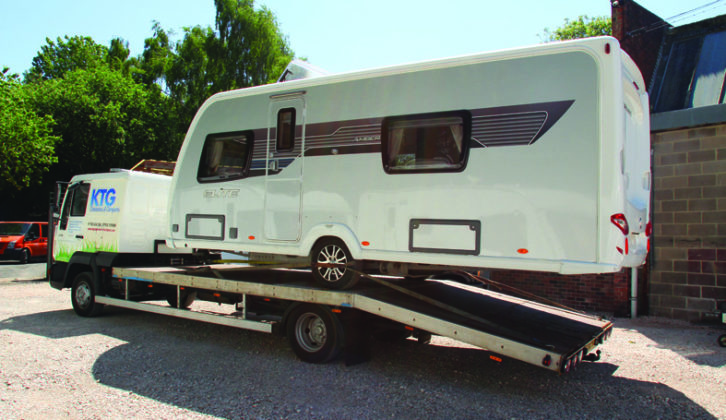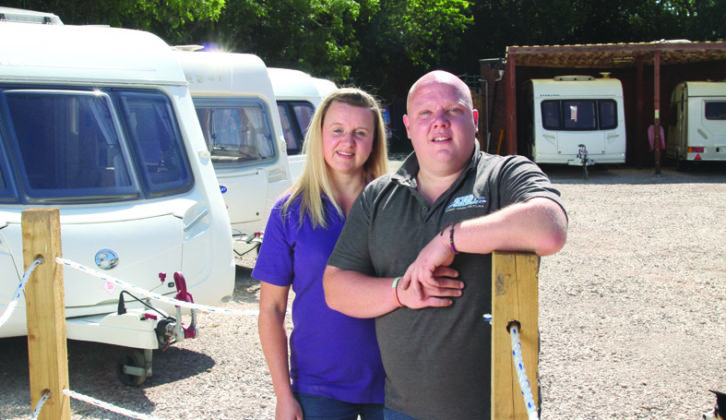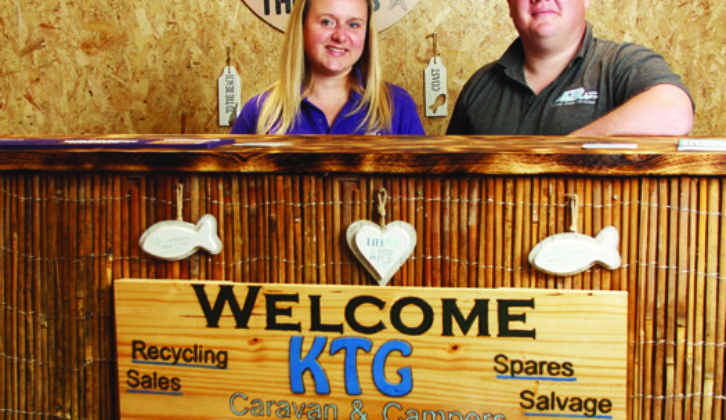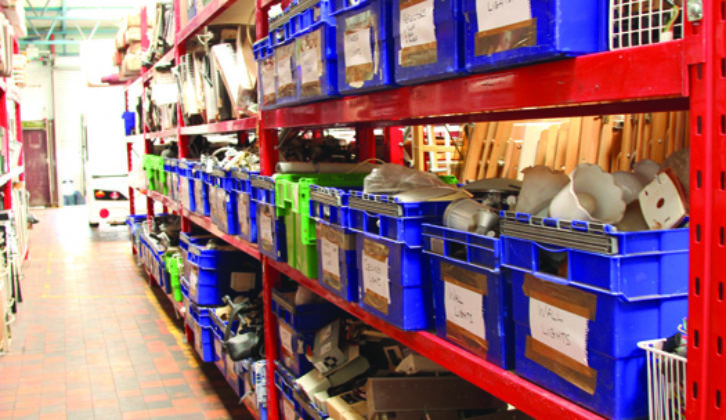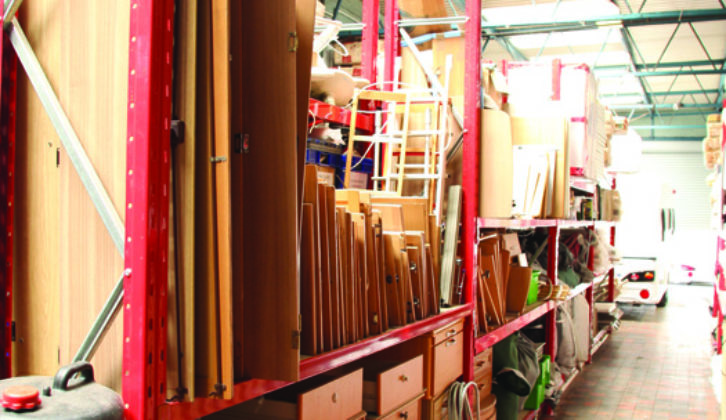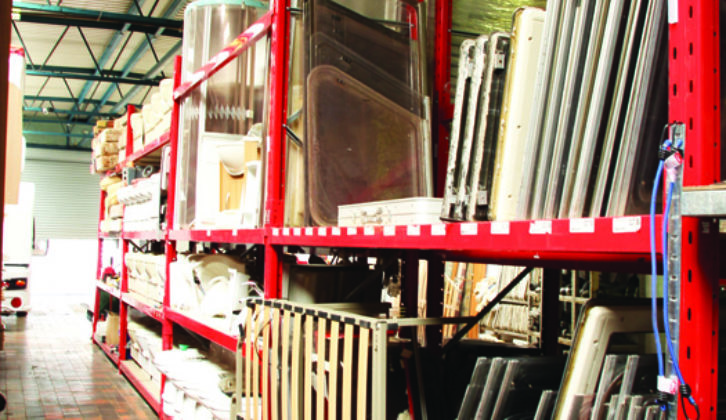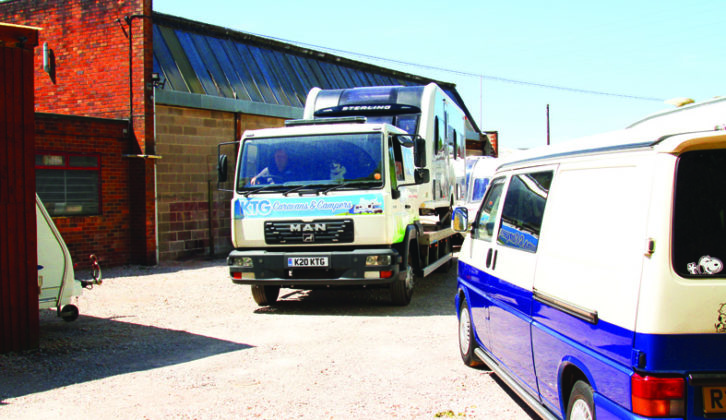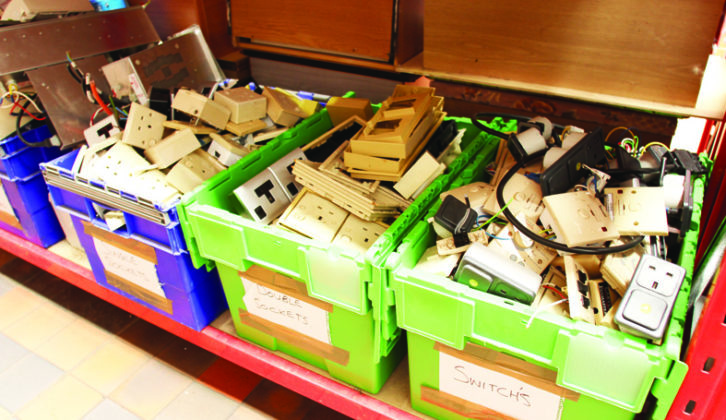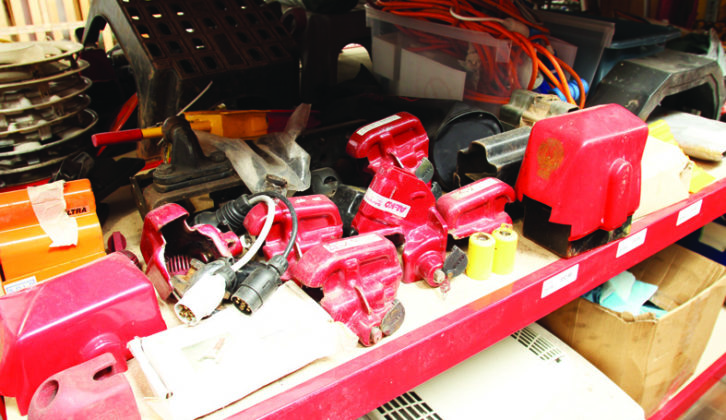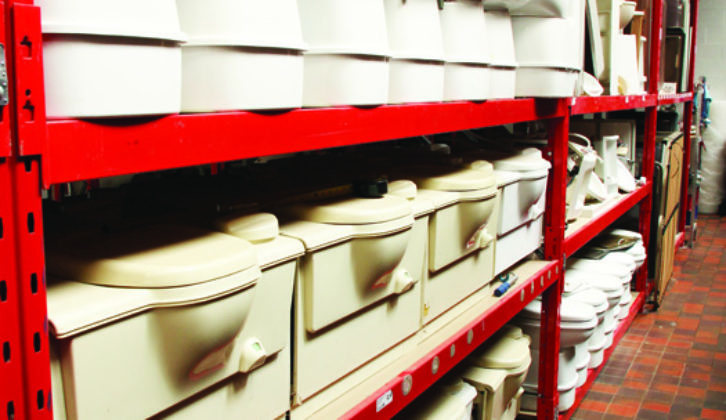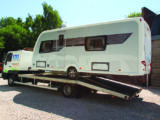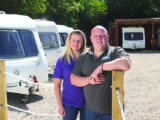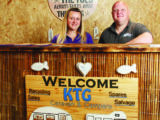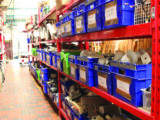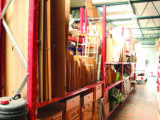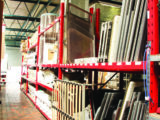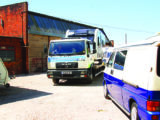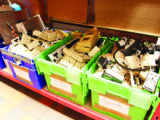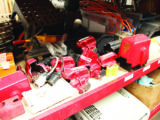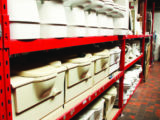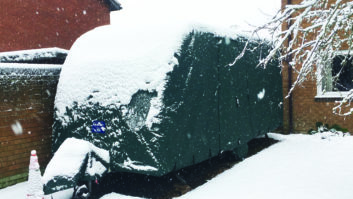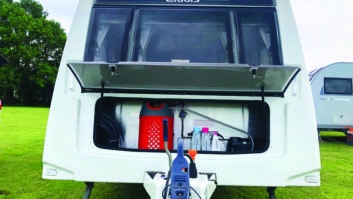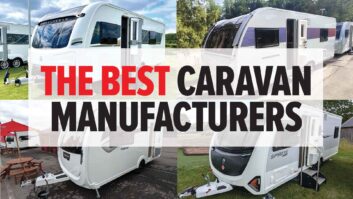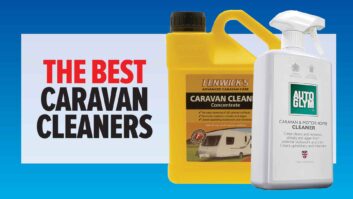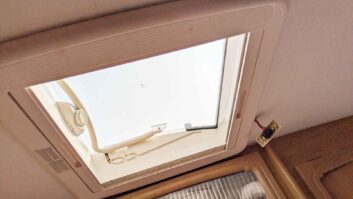There are many excellent reasons to consider buying salvage parts for your caravan if you need spares. You could save time, money – and the planet.
Shipping in brand-new parts from abroad is likely to produce a significant carbon footprint, and can take weeks or months, so instead, why not consider purchasing an as-new part from a local spares company?
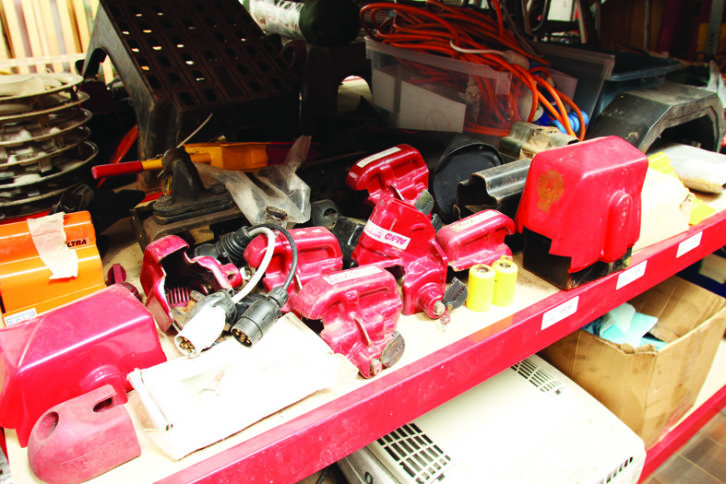
The components will have been checked and cleaned, you might get them the very next day, and you’ll also be putting money back into the local economy (something that is all-important right now).
The hunt for spares
Whether a caravan is new or old, it can sometimes be tricky and quite time-consuming to obtain certain spare parts for it.
I’ve heard tales of caravanners losing months of prime touring time when spare parts prove particularly difficult to get hold of, especially if the component makers are based abroad.
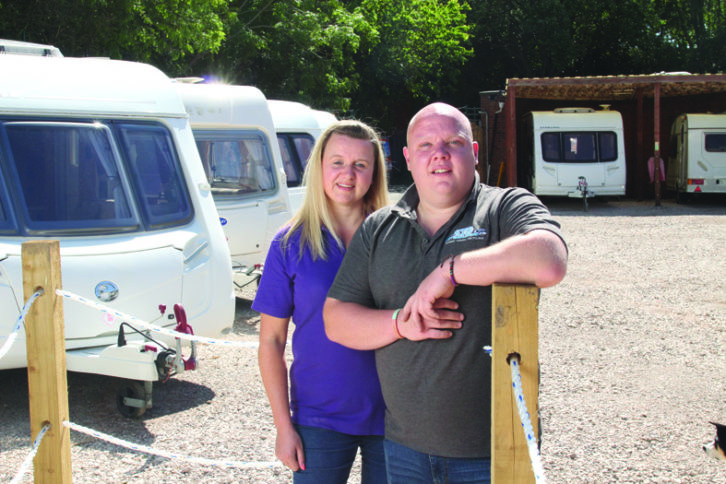
Even with newer vehicles – models that are ‘made in Britain’ – there could be a significant delay, while the parts are shipped in from overseas. British-built caravans contain many elements – a list that could include everything from the windows to the electronic systems – that are sourced from foreign manufacturers.
Another potential problem might be the furnishings. In the past, new upholstery and cushions have been stolen to order for some models, and victims have been astonished to discover that they can cost thousands to replace.
Yet sourced from a salvage operator, the same cushions are far more likely to be priced somewhere in the hundreds.
The salvage business
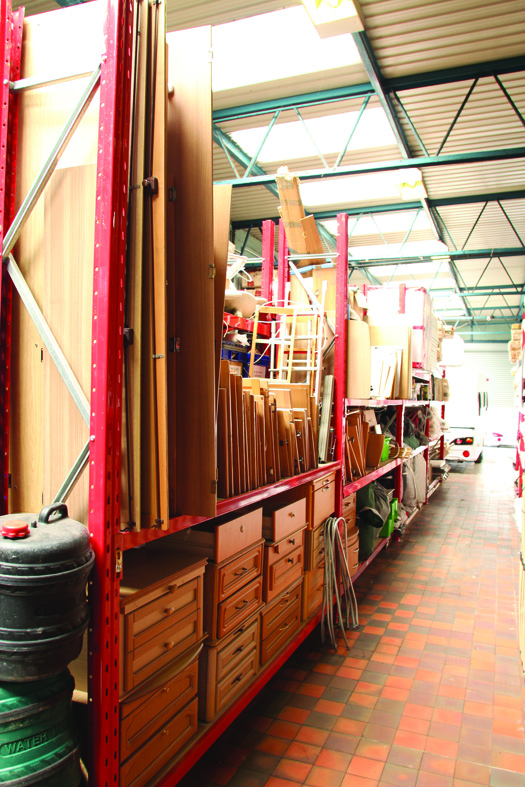
Imagine that a newish caravan is damaged in a rear-end crash. It is recovered to the owner’s local dealership; here it will be assessed by technicians, who discover that although the damage doesn’t look all that severe, the roof, floor, rear and side panels have all been affected.
They estimate repairs will cost £9000, for new panels and an almost complete rebuild of the structure. This information is then reported to the insurers, and an assessor is sent out to confirm it.
Factoring in the hassle for all involved, and mindful of the customer’s desire to get back on the road (plus any potential hold-ups in sourcing parts and repairs), the insurer decides that it is uneconomic to try to repair the vehicle, and writes it off. The owner receives a payment to buy a new ‘van, and the damaged one becomes the property of the insurer.
Despite the damage, 90% of the interior and all of the appliances and upholstery are untouched and remain as good as new, which means that this ‘van has value to a salvage business.
Salvage and recycle
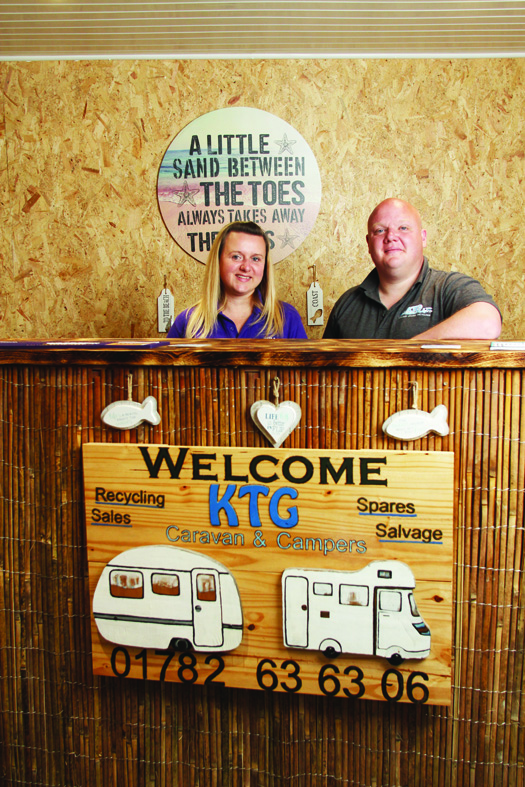
A family-run business, KTG Caravans & Campers, in Newcastle-under-Lyme, Staffordshire, has dealt in salvage, spares and recycling for a decade.
Initially, the company was backed by The Prince’s Youth Business Trust, when owner Karl Pearce was just 23. He takes up the salvage story:
“We buy the written-off vehicle from the insurance company. The price we pay is a percentage of the value given in Glass’s Caravan Guide, and varies depending on the category of damage”. For example, Category S indicates structural damage, while Category N denotes non-structural.
“After 10 years in the business, I can tell straight away what a vehicle is worth in parts. In about one-in-10 cases, we’ll repair and then sell it.”
KTG strips each salvage vehicle completely, and what remains is disposed of professionally. “We recycle everything,” says Karl. “Windows, furniture, appliances and upholstery are all removed and stored.
“We don’t just deal in write-offs, either,” he adds. “If an owner finds, say, significant damp in their tourer, which is uneconomic to repair, we can offer them a good price to take it off their hands, and give them a chunk of deposit for their next leisure vehicle.”
UK-wide collections
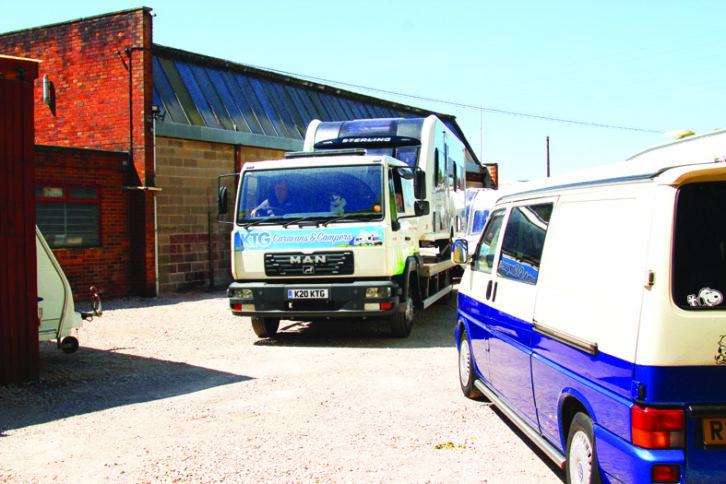
“We have a flat-bed lorry and collect tourers from anywhere in the country. We’ve even been abroad. I was in Suffolk yesterday, and I’m off to Ireland on Friday! We pay cash on collection, so there’s no delay, and the owner gets the ‘van off their drive, or the dealer’s forecourt, quickly and easily.”
Once back at base, salvage vehicles will be carefully dismantled. KTG stores all of the spares on racking in its warehouse.
This includes everything from locker doors and cookers, to RCDs and toilets. Many of these parts come from older vans and are difficult, if not impossible, to buy new. Karl explains: “Say you need a replacement oven for a 2005 model. You can contact us by phone or email and we’ll check to see if we have the part in stock.
“If we have, we’ll give the buyer a full description of the product, including any marks, if they exist, and then we can agree on a price.
“We can then retrieve the item from the warehouse, give it a full technical and safety inspection, and clean it thoroughly. Then my partner, Nicola, dispatches it to the purchaser or their dealership by next-day delivery.
“Our customers can also take confidence in the fact that our parts come with a three-month warranty. We have always been caravaners and campervanners ourselves, so we know how important it is to have your leisure vehicle in working order, ready for the next adventure. “If we have the part in stock, you’ll then receive it in a matter of days, not weeks or months.”
Speedy service
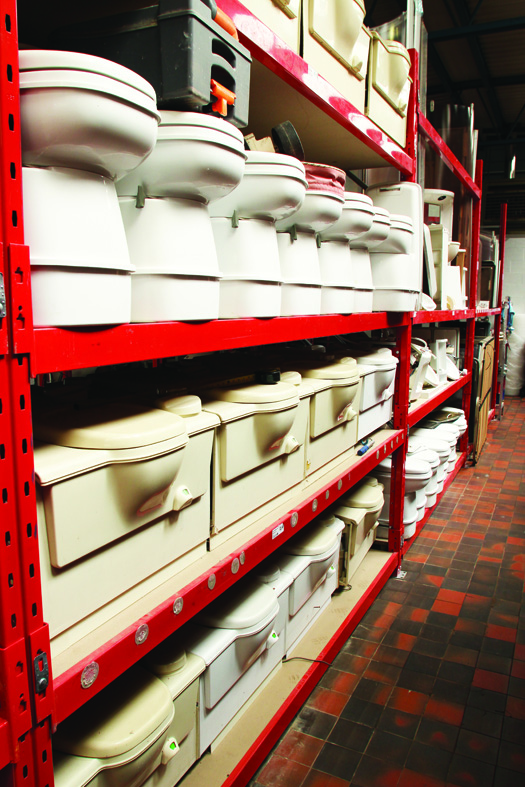
So, all in all, salvage is a great option to consider for those who own older caravans, where new replacement parts are unavailable; where money is tight in these straitened times and where speed is of the essence.
Just search ‘caravan salvage’ online and then, taking note of the customer feedback (for example, you’ll see KTG Caravan & Campers has some 50 positive reviews), simply pick up the phone. Everyone, including Mother Earth, should be a winner in this business!
SALVAGE YARDS
KTG Caravans & Campers
- Staffordshire and nationwide
- Tel 01782 636 306
- Web ktgcaravansandcampers.com
National Caravan Salvage
- Colwyn Bay, North Wales
- Tel 01492 512 880
- Web nationalcaravanbreakers.co.uk
New & Used Caravan Parts
- Castleford, West Yorkshire
- Tel 01977 604 656
Halesowen Caravan Centre
- West Midlands
- Tel 0121 550 7949
- Web halesowencaravancentre.co.uk
DDS Caravan Supplies
- Oldham, Greater Manchester
- Tel 01706 847 776
- Web ddscaravansupplies.co.uk
Essex Caravan Breakers
- Stanford-le-Hope, Essex
- Tel 07786 391 015
- Web essexcaravanbreakers.co.uk
MK Caravans
- Rochford, Essex
- Tel 01702 541 001
- Web salvagecaravans.com
Jones Caravan Breakers
- Aspatria, Cumbria
- Tel 01697 451 306
- Web jonescaravanbreakers.com
Insurer’s perspective
A leading insurer explains how they write off a caravan, which might go to salvage:
“The decision to write off is a balance of economics. Do the repair costs exceed the insured value? That’s muddled if there’s new-for-old cover, rather than market value, especially if it is old. We take into account any salvage value before we write it off.
“We also factor in the possibility of further damage becoming evident, parts availability and supply delay, and where practical, the customer’s preference.
“For example, does the layout of the van particularly suit the owner, meaning they have a desire to keep it? There are too many factors for it to be simply a case of a fixed percentage point at which any unit is a write-off.”
“Not all caravans are made the same, and not all parts are equally priced or readily available. Damage that might be a viable repair on one van might not be so on another.
“For years, the insurance industry referred to the Association of British insurers (ABI) code of practice when classifying damage to a van. This worked well until 2017, when the ABI amended the classification for the benefit of the motor industry, but it became unrealistic to relate it to caravan salvage.
“That means, in most cases, insurers work on the basis of the original code.
“We would always prefer to dispose of salvage through a specialist, in the interests of safety. In some circumstances, we do consider allowing an owner to buy the salvage, but this is rare.
“The salvage industry is highly regulated. Selling to an accredited agent helps to ensure that if a van goes back on the road, it is safe to do so. If we do allow an owner to ‘buy back’ the unit, they would have to match the best salvage offer we receive and the unit would be registered with CRiS as having been damaged.”
If you liked this… READ THESE:
If you’ve enjoyed reading this article, why not get the latest news, reviews and features delivered direct to your door or inbox every month. Take advantage of our brilliant Practical Caravan magazine SUBSCRIBERS’ OFFER and SIGN UP TO OUR NEWSLETTER for regular weekly updates on all things caravan related.
Future Publishing Limited, the publisher of practicalcaravan.com, provides the information in this article in good faith and makes no representation as to its completeness or accuracy. Individuals carrying out the instructions do so at their own risk and must exercise their independent judgement in determining the appropriateness of the advice to their circumstances. Individuals should take appropriate safety precautions and be aware of the risk of electrocution when dealing with electrical products. To the fullest extent permitted by law, neither Future nor its employees or agents shall have any liability in connection with the use of this information. You should check that any van warranty will not be affected before proceeding with DIY projects.
Components are checked and cleaned, you might get them next day, and you're putting money into the local economy
